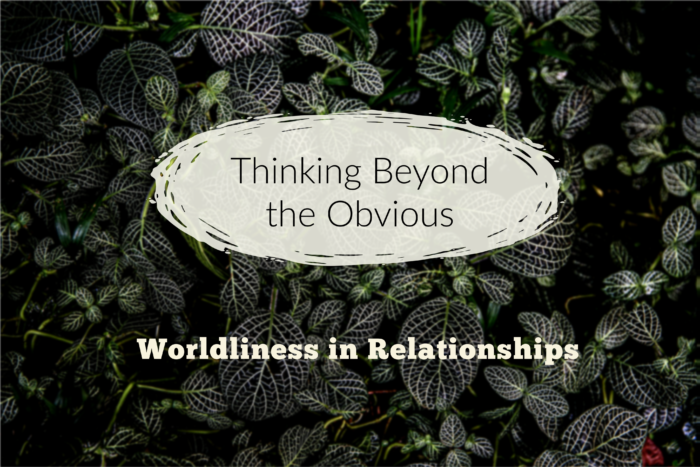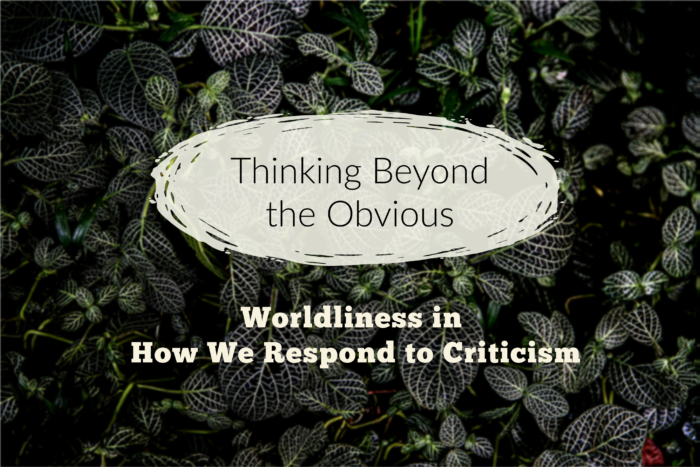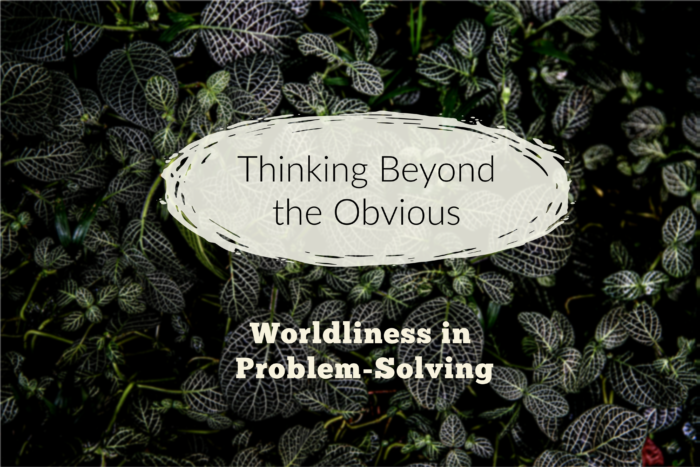Judgements, the Bible, and Incomplete Information
We all make judgments. We make judgments about what is beautiful and what isn’t. And about what is “normal” and what “isn’t normal”. We make judgments about whether someone is doing something right or something wrong; And about whether someone is doing something wise or something foolish. We all do it. And we all do this quite naturally, whether we speak our judgments aloud or not.
But there are two things that we believers really should consider before we pass judgment. Before I go on I’d like to mention that this is something God has been teaching me, oh so gradually, over the course of my lifetime and I am definitely not the same person I used to be. But I am still growing in this area. It’s so easy to write about something the Bible teaches, but learning to live it out takes a lifetime.
The FIRST thing for our consideration is this: Is my judgment based on God’s Holy Word or is it based on my opinion?
If it’s based on my opinion then does it really matter? What makes one opinion better than another?
Here’s a silly example (albeit a practical one). Let’s consider a woman’s shirt. Let’s say I notice a co-worker’s new shirt and I just don’t like it. It’s bright and loud in a color I do not care for and I find it very unappealing. Why is my opinion about that shirt better than the wearer’s opinion? And does it really matter?
Now, let’s take that same shirt and let’s say that it is cut very low and is very immodest. The Bible tells us to dress modestly (I Timothy 2:9-10). So now I am making a judgment between right and wrong which, in fact, we are supposed to do (Matthew 7, I Thess. 5:21-22, and others).
Judgments that are based on our opinions don’t always need to be said. But sometimes they do need to be shared. For example, in committee meetings or family gatherings, when a plan is being developed or a vacation planned. At that point, we speak up with the understanding that there is really no “right” or “wrong” in the situation but that our opinion is simply based on preference.
But what we do with our biblical judgments? Are we to speak each one? This is probably worth a post all its own but, for the sake of time and space here today, let’s just nutshell it in this way: True love discerns, through prayer, when speaking truth is appropriate and is willing to confront when necessary. A lot of harm has been done by parents, pastors, teachers, and others who were simply unwilling to speak biblical truth into the lives of others because they were worried about offending.
This leads to the SECOND thing which we must consider: Are we are aware that we may have incomplete information as to why someone made a choice?
This is not regarding the actual making of judgments but, rather, about our attitudes that accompany our judgments.
When we make biblical judgments, we make them based on our own life experiences. This leads many of us to give no grace, no mercy, no lee-way for other life experiences.
So, for example, someone growing up in a Christian home will naturally know the Bible better than a baby Christian who just got saved as an adult and is learning. Do we have grace for the baby Christian who is just learning?
Or another example is that perhaps someone made a decision for a very good reason but you, looking from the outside, are not privy to the reason for that decision and are judging them for doing something unwise based on your incomplete information. We don’t always know the facts and perhaps they didn’t do anything unwise at all.
Do we give people the benefit of the doubt? Or do we fall prey to having a “holier than thou” attitude?
We only have our life experience from which to form judgements. But it’s so important to recognize that our life experiences are not the gold standard. Only the Bible can and should inform all of our judgments.
And this should lead us to grace and mercy as we remember our life is not their life. And they may have challenges about which we have no idea at all. This doesn’t mean we don’t talk with them when we see sin or worldliness. It just means we have a humble, loving attitude that acknowledges we may not know everything.
So… what if a judgment is based on scripture and you find yourself concerned about someone you love? What to do?
Our natural response is to gossip or to make sarcastic, passive-aggressive remarks letting others know how we feel. The godly response is to keep quiet and go to that person personally and find out the whole story; find out why they made the choice they did and lovingly and kindly point to the scripture that shows that it is wrong.
Can you see why correct interpretation and honest hermeneutics of God’s Word are so critical to life? There are so many manmade “rules” and “laws”—rules and laws that man has created that are simply not in scripture. And there are also so many principles and commands that go completely ignored and neglected by professing Christians who love the world.
And can you see why it’s so important to be able to recognize an opinion-based judgment from a scripture-based judgement?
I have been judged for many things throughout my life. One that sticks out in my memory is being judged for drinking orange juice with my pop-tart instead of milk. Someone made me feel like a fool because of this decision.
As I reflect on that experience, which is over twenty years ago now, I find it such an unnecessary judgement. It’s a silly example but there are so many just like it that happen every day.
Judgments like this build walls instead of building unity. They create division instead of creating a loving, safe place to grow together.
Oh, that we may recognize the difference between our subjective, opinion-based judgments and objective, scripture-based judgments. May we handle any judgment in a loving, biblical manner that will support and encourage God’s family, rather than tear it down.










